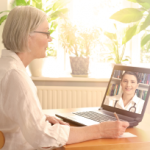Q: How could rheumatology training programs include more telemedicine education or training for fellows so they feel comfortable using this technology?
Fellows [need] to learn how to triage patients to see which cases are safe to see over telemedicine [vs. those who] would benefit from in-person visits. Triaging is very important, especially for patients with rheumatic diseases. If a patient is flaring or needs to change a biologic medication, those conversations are better made in person and with an appropriate physical exam.
I find that telemedicine visits work best for patients with stable disease and established patients. Gloria Salazar, MD, and Filemon Tan, MD, have been leaders in training the fellows at UT Health Rheumatology. We did receive email modules on how to access the platforms, and we learned how to triage patients by working with our attendings directly.
In the future, I hope telemedicine training becomes an integral part of the fellowship lecture series. It will be a great skill to acquire, a skill our patients appreciate. The technology allows us to change with the times and learn to adapt ways to practice rheumatology while keeping our patients at the center of our care.
Susan Bernstein is a freelance journalist based in Atlanta.
Telemedicine Resources from the ACR
The ACR supports the role of telemedicine as a tool with the potential to increase access and improve care for patients with rheumatic diseases. It also offers multiple resources to aid clinicians with telemedicine.
Check out:
- The ACR’s official telemedicine position statement;
- The Telehealth FAQ;
- The Telehealth Provider Fact Sheet;
- The Telehealth Quick Reference Guide; and
- Commercial Payer Temporary Telehealth Policies.


